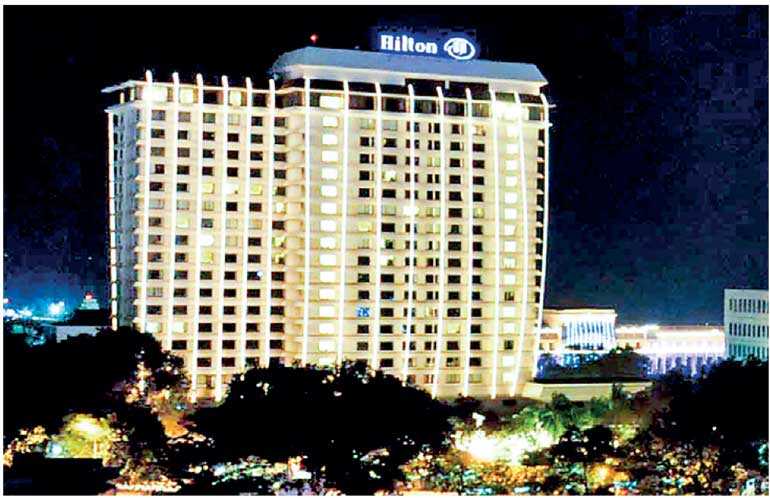Thursday Feb 19, 2026
Thursday Feb 19, 2026
Tuesday, 30 October 2018 00:58 - - {{hitsCtrl.values.hits}}

The announcement to sell Hilton and Hyatt is a case of “cart before the horse”. It has given many questionable reasons to sell the assets while not specifying how the proceeds would be utilised. In fact it should have happened the other way around
The Government has announced its decision to divest State-owned Hilton and Hyatt Hotels. The problem with this announcement is not the announcement per se, but the justification of this decision.
Poor justification
The motives given for the sale are: the entities could be more profitable if it’s managed by private sector, more investments are needed to complete the hotels and the Government would have to resort to expensive borrowings, public money should not be spent on building hotels and proceeds of the sale could be used for the benefit of the public.
The reasons are either arguable or not strong justifications for the conclusion. In fact, the most troubling is “the sales proceeds could be used for the benefit of the public”, if it means that it would be just distributed in the form of welfare measures or vote buying purposes prior to elections. While there is a compelling reason to sell non-strategic state assets, it is none of the above motives.
Need to revive the economy
The fiscal consolidation agenda as prescribed by the IMF has increased taxes and coupled with policy uncertainty under the current political set up, has firmly applied brakes on the economy. The Sri Lankan economy is growing well under 4% and is in the dire need of a revival.
That revival could come in the way of a determined investment drive initiated by the Government so that the private sector and foreign investors could follow. Hence an exit from the flawed objective of reducing the budget deficit which is being implemented unsuccessfully over the last few years is required.
Where should Government invest?
Sri Lanka has been broadly stuck in the export of apparel and other traditional items since 1980s and had not been able to advance in the global value chain by penetrating into more advanced industries such as electronics, automobiles, computers, etc.
Recently-developed nations such as Taiwan and South Korea successfully implemented this shift during 1970s-1990s. Currently Sri Lanka faces the risk of being overtaken by economies that were behind us such as Bangladesh, Vietnam and Myanmar.
Therefore the Government should initiate an investment drive to provide the necessary infrastructure for these industries to start in Sri Lanka.
Compelling case to exit nonstrategic State assets
This coupled with other investment needs of the Government to set the economy on a sustainable long-term growth path means the Government needs the funds to meet this investment requirement. As the economy is already taxed heavily, there is no way that the taxes could be raised. While borrowing is an option, the not-so-low financial leverage prevailing currently would mean that additional revenue sources should be explored.
Hence there is a compelling case to monetise or divest nonstrategic State assets. This is not with the objective of providing short-term welfare for the public, but for the long-term growth of the economy.
Avoid selling strategic assets
The authorities may have done a blunder by divesting the majority ownership of the Hambantota Port which is arguably the most strategic of assets the country possesses. Hence the policymakers should clearly understand the strategic assets of the country and refrain from divesting controlling stakes of such assets which would undermine the long-term growth potential.
Accordingly, the relevant line of questioning to identify non-strategic assets would be: Does the Government need so much presence in the banking sector? Not only the three largest banks are State-owned, but sizeable stakes of all the larger private banks are held by the Government through EPF and Insurance Corporation. Similarly, a hotel in Colombo is not a strategic asset for the State.
Need to shift from traditional assets to modern assets
The Opposition has generalised this issue and has uniformly announced that they are against the sale of any State asset as a principle. This could be a grave mistake as well.
As highlighted earlier, the country needs to invest heavily in the appropriate sectors and it has to be initiated by the Government. Therefore the Government needs substantial funding and borrowings alone would not be sufficient in view of the risk associated with the rise in borrowings. Hence it becomes essential that the Government lets go of certain nonstrategic assets so that more strategic assets could be acquired for the long-term sustainable growth of the economy.
Cart before the horse
The announcement to sell Hilton and Hyatt is a case of “cart before the horse”. It has given many questionable reasons to sell the assets while not specifying how the proceeds would be utilised. In fact it should have happened the other way around.
The Government should have listed down the economic plan or the investment drive to revive the economy which should include the entry to strategic, high value-add global industries. Selling of nonstrategic assets should then only be a minor part of financing that investment drive.
Grave concern for independent analysts
A justifiable concern for independent analysts would be, whether all assets (strategic as well as non-strategic) would be sold, as the case with the Hambantota Port, for consumption purposes. With possible saleable assets exhausted, reviving the economy would be even more difficult for a more methodical set of policy makers at a future point in time.
(The writers could be contacted via [email protected])